Unit9Have you ever been to a museum.SectionA1a~2d课件2023-2024学年度人教版英语八年级下册
文档属性
| 名称 | Unit9Have you ever been to a museum.SectionA1a~2d课件2023-2024学年度人教版英语八年级下册 |
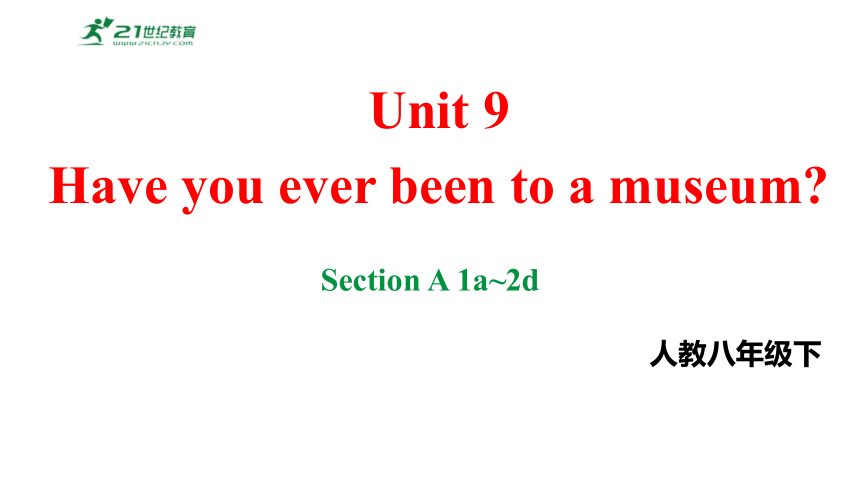
|
|
| 格式 | pptx | ||
| 文件大小 | 68.3MB | ||
| 资源类型 | 试卷 | ||
| 版本资源 | 人教新目标(Go for it)版 | ||
| 科目 | 英语 | ||
| 更新时间 | 2024-04-26 00:00:00 | ||
图片预览

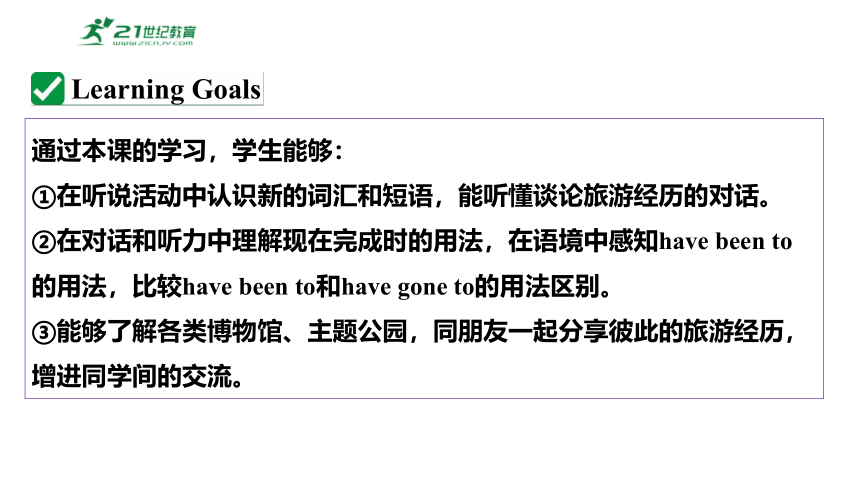
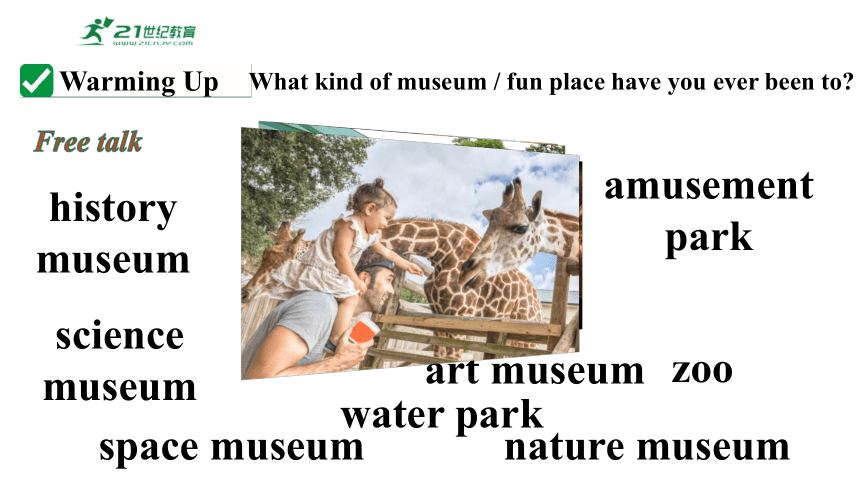

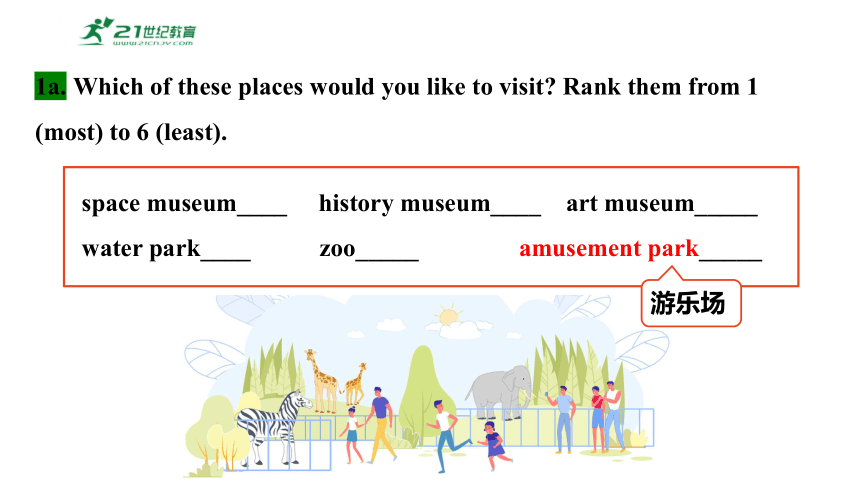


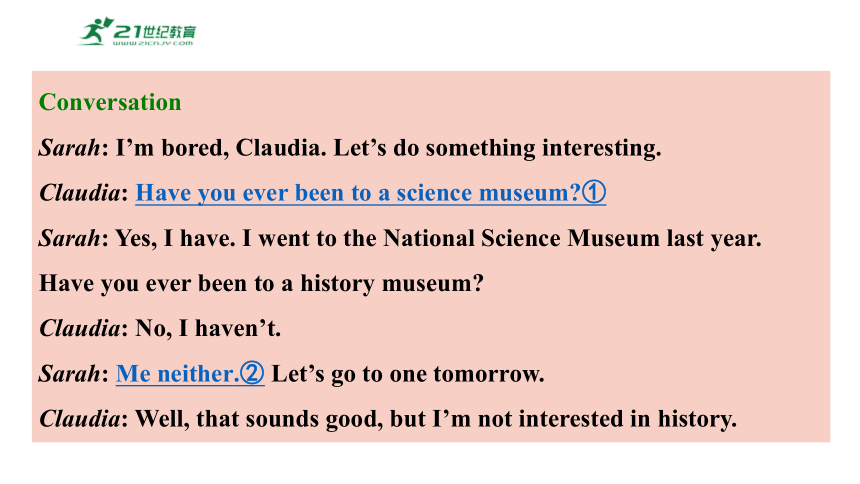
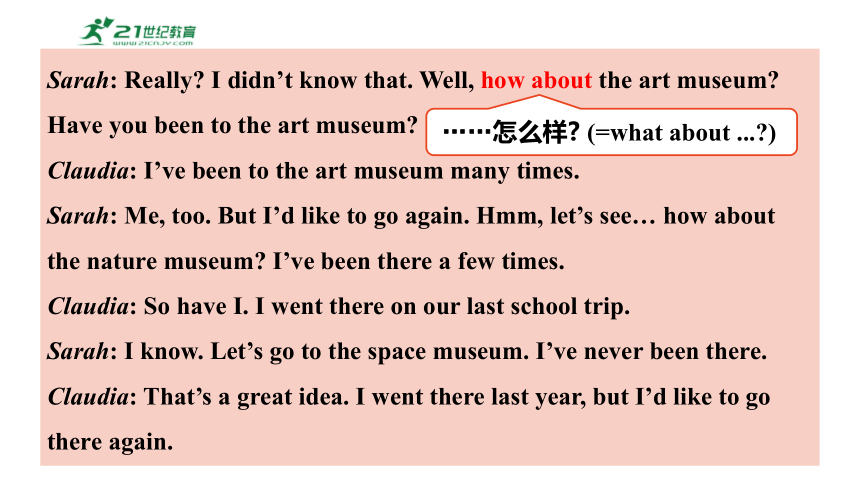

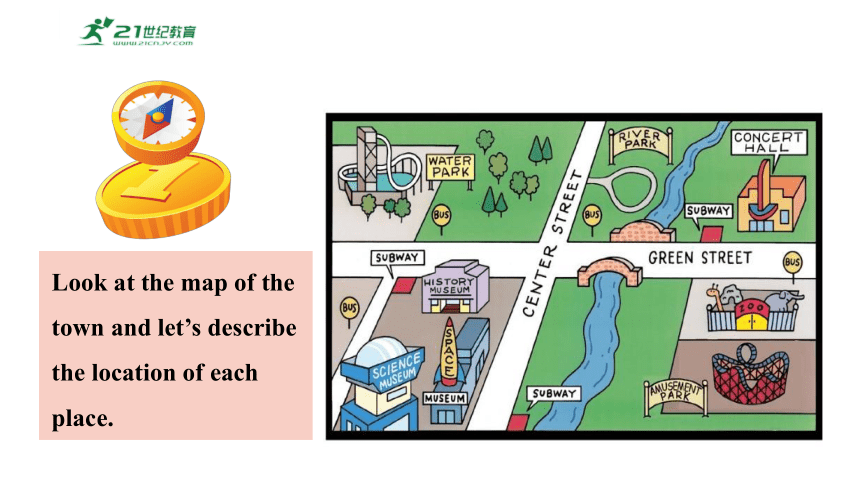
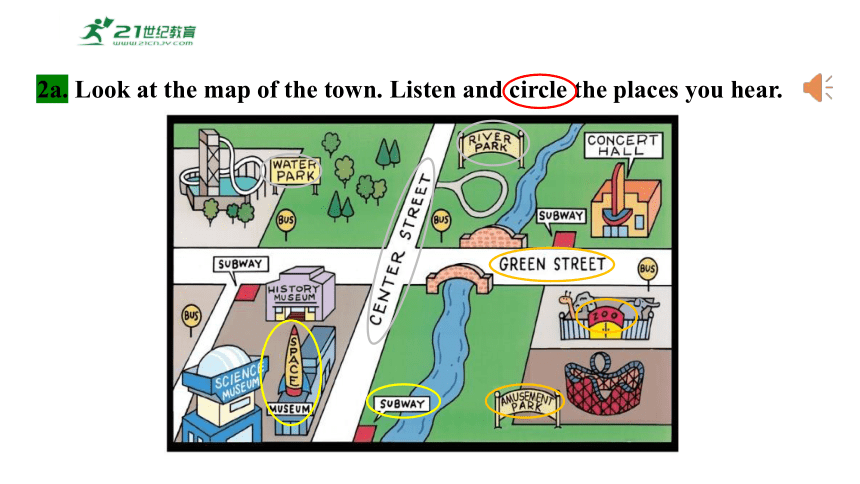
文档简介
(共40张PPT)
Unit 9
Have you ever been to a museum
人教八年级下
Section A 1a~2d
通过本课的学习,学生能够:
①在听说活动中认识新的词汇和短语,能听懂谈论旅游经历的对话。
②在对话和听力中理解现在完成时的用法,在语境中感知have been to的用法,比较have been to和have gone to的用法区别。
③能够了解各类博物馆、主题公园,同朋友一起分享彼此的旅游经历,增进同学间的交流。
Learning Goals
Free talk
amusement park
water park
space museum
history museum
science museum
nature museum
art museum
zoo
Warming Up
What kind of museum / fun place have you ever been to
Look at the picture.
What are the two girls
talking about
Read the dialogue and
describe the picture.
Pre-listening
1a. Which of these places would you like to visit Rank them from 1 (most) to 6 (least).
space museum____ history museum____ art museum_____ water park____ zoo_____ amusement park_____
游乐场
1b. Listen. Have these students ever been to these places Check (√) the boxes.
Name Science museum History museum Art museum Nature museum Space
museum
Claudia
Sarah
√
√
√
√
√
√
While-listening
1. When did Sarah go to the National Science Museum
2. Has Sarah been to a history museum
3. What does Claudia say about history
She went there last year.
No, she hasn't.
She is not interested in history.
Now, listen again and answer the following questions.
Conversation
Sarah: I’m bored, Claudia. Let’s do something interesting.
Claudia: Have you ever been to a science museum ①
Sarah: Yes, I have. I went to the National Science Museum last year.
Have you ever been to a history museum
Claudia: No, I haven’t.
Sarah: Me neither.② Let’s go to one tomorrow.
Claudia: Well, that sounds good, but I’m not interested in history.
Sarah: Really I didn’t know that. Well, how about the art museum
Have you been to the art museum
Claudia: I’ve been to the art museum many times.
Sarah: Me, too. But I’d like to go again. Hmm, let’s see… how about
the nature museum I’ve been there a few times.
Claudia: So have I. I went there on our last school trip.
Sarah: I know. Let’s go to the space museum. I’ve never been there.
Claudia: That’s a great idea. I went there last year, but I’d like to go
there again.
……怎么样 (=what about ... )
Your Time
1c. Ask and answer questions about the places in 1b.
A: Let’s go somewhere different today.
B: OK. Where do you want to go
A: Have you ever been to the space museum
B: No, I haven’t. How about you
A: …
/ s mwe (r) /adv.在某处
Look at the map of the
town and let’s describe
the location of each
place.
2a. Look at the map of the town. Listen and circle the places you hear.
2b. Listen again and circle T for true or F for false.
Conversation 1 Conversation 2 Conversation 3
1. Tina went to the
space museum last year. T/F
2. John has never
been to the space
museum. T/F
3. They are going
to take the subway.
T/F
1. Linda has been to
the amusement park.
T/F
2. Linda went to the
amusement park
yesterday. T/F
3. Linda is going to the
amusement park
again by bike. T/F
1. Frank had a great
time at the water park.
T/F
2. Frank’s friend has
never been to the
water park. T/F
3. Frank and his friend are going skating.
T/F
Conversation 1
John: Hey, have you ever visited the space museum, Tina
Tina: Yes, I went there last year. Have you ever been there, John
John: No, I haven’t.
Tina: Well, I’d really like to go there again.
John: Great. What bus do we take to get to the museum
Tina: We can take the subway. The station is near the museum.
/ s bwe /n. 地下铁道;地铁交通
Conversation 2
Kim: Hi, Linda. Have you ever been to the amusement park
Linda: Yes, I have, but a long time ago. I remember it was really fun.
There were so many exciting things to do there.
Kim: Do you want to go again next week
Linda: Sure. I think that would be a great idea.
Kim: Do you think we can ride our bikes there
Linda: Of course! It’s not very far away. It’s just on Green Street,
behind the zoo.
Conversation 3
Tom: Have you ever been to the water park, Frank
Frank: No, I’ve never been there.
Tom: Neither have I. Let’s go there together!
Frank: I’d really love to go, but I don’t have any money.
Tom: Well, let’s go skating instead. There’s a great new place for
skating in River Park on Center Street.
Frank: That’s a great idea. Could I borrow your bike I want to go
home to get my skates.
去滑冰
I’d really like to go there again.
What bus do we take to get to ...
There were so many ... things to do there.
Neither have I.
Let’s go ... instead.
There’s a great new place for…
Here are some sentences you may use:
Your Time
2c. Look at the map in 2a and make conversations about the places.
A: Have you ever been to the space museum
B: Yes, I have. How about you
A: No, I haven’t.
B: Oh, it’s fantastic. Let’s go tomorrow.
A: OK. How are we going to get there
B: We can take the subway.
乘地铁 (=by subway)
Read the conversation in 2d and answer the questions.
When did Jill go to the film museum
What does Jill love about the film museum
What did Jill learn about
In April.
She loves all the old movie cameras.
She learned about the inventions that led to color movies.
Who did Jill camp with on the weekend
Has Anna ever been camping
With her friends.
No, she hasn’t.
2d. Role-play the conversation.
Anna: I went to the film museum last weekend. Have you ever been there
Jill: Yes, I have. I went there back in April.
Anna: It’s really interesting, isn’t it It’s a great way to spend a Saturday afternoon.③
Jill: Yes, I love all the old movie cameras there. I learned about the inventions that led to color movies, too.
Anna: So, what did you do on the weekend
/ k m( )r /n. 照相机
/ n ven ( )n /n. 发明
Jill: I camped in the mountains with some friends. We put up a tent and cooked outside.
Anna: That sounds fun. I’ve never been camping.
搭帐篷
Post-listening
Disappearing dialogue
Anna:
Jill: Yes, I have. I went there back in April.
Anna: It’s really interesting, isn’t it
Jill: Yes, I love all the old movie cameras there.
I went to the film museum last weekend. Have you ever been there
It’s a great way to spend a Saturday afternoon.
I learned about the inventions that led to color movies, too.
Anna: So, what did you do on the weekend
Jill:
Anna: That sounds fun. I’ve never been camping.
I camped in the mountains with some friends. We put up a tent and cooked outside.
Let’s talk!
Who
Where
When
How
What
I have been to…
When I was there, I did…
I went there by…
I went there…
I went to a film museum with …
I think...
Key Phrases
游乐场 ______________________
……怎么样 (=what about ... ) ______________________
去滑冰 ______________________
乘地铁 (=by subway) ______________________
搭帐篷 ______________________
amusement park
how about...
go skating
take the subway
put up a tent
1. Have you ever been to a science museum
Language Points
意为“曾经去过”,说话时已不在去过的地方,常与ever, never, just等连用。后可接次数,如once, twice, three times 等,表示“去过某地几次”。
have been to
虽然我已经去过青海湖两次了,但我不介意再来一次。
e.g. Although I have been to Qinghai Lake twice, I don't mind visiting it a third time.
have gone to
意为“去了某地”,表示到了某地或正在去某地的途中,总之说话时该人不在现场,一般不用第一、二人称作主语。
e.g. They have gone to Beijing.
他们已经去北京了。
Instant Training
1. 凡是去过大连的人都说大连很美。
Those who ________________ Dalian all say it’s beautiful.
2. 我父母已经去杭州度假了。
My parents ________________ Hangzhou for holiday.
have been to
have gone to
2. No, I haven’t. Me neither.
Me neither 表示自身的情况与前面的否定情况一样,相当于 Neither/ Nor have I。
“Neither/Nor + 情态动词/助动词/be动词 + 主语” 表示所描述的否定情况也同样适用于另一个人/物。
e.g. — I don’t like summer. It’s too hot. — 我不喜欢夏天。太热了。
— Me neither. (= Neither do I.) — 我也不喜欢。(我也是。)
【拓展】
① 若表示自己的情况和前面的肯定情况一样,
则用 Me too 或“So + 情态动词/助动词/be 动词+I”。
e.g. — I often go to the library.
— 我经常去图书馆。
— Me too.(=So do I.)
— 我也是。
② neither pron. 两者都不
e.g. Neither answer is correct.
两个答案都不对。
Neither of them has/have a car.
他们两个都没有汽车。
③ neither adv.(否定的陈述同样适用于其他人或物)也不
e.g. Jack didn’t remember and neither did I.
Jack没记住,我也忘了。
Their house is neither big nor small.
他们的房子不大也不小。
Instant Training
1. Leo不是医生。我也不是。
Leo is not a doctor. _________________________
2. 这两道物理题都不难,王华很轻松地就做出来了。
________ ________the physics problems is difficult. Wang Hua worked them out easily.
Me neither. / Neither am I.
Neither of
3. It’s a great way to spend a Saturday afternoon.
(1)表示“花(时间);度过”时:
① spend sth. (on sth.)
e.g. It's necessary for us to spend some time on our hobbies.
我们有必要花一些时间在我们的爱好上。
② spend sth. (doing sth./in doing sth.)
e.g.Tom loves English novels, so he spends a lot of time reading them in the library.
汤姆喜欢英语小说,所以他花很多时间在图书馆。
Many people regret spending too much time in watching short videos.
许多人后悔花费太多时间来浏览短视频。
(2)表示“用,花(钱)”时:
③ spend sth. (on sth./on doing sth.)
e.g. I’ve spent all my money already.
我已经把我的钱全都花完了。
Mia spent £100 on a new dress.
Mia花100英镑买了一条新连衣裙。
Instant Training
1. 我大多数空余时间都在阅读,我还订购了很多报纸、杂志。
I ________ most of my spare time _________ and I subscribe to various newspapers, magazines.
2. 这幢气派的大楼花了大量的钱。
Large amounts of money were __________ the magnificent building.
spend
reading
spent on
1. I _____ to the West Lake four times, but I will go there again this summer.
A. have gone B. have been C. went D. had gone
2. —I have never been to London. — _____ have I.
A. Neither B. So C. Also D. Well
3. Let’s go ____ today.
A. somewhere different B. different somewhere
C. anywhere different D. different anywhere
一、单项选择。
A
B
A
Exercises
我去过北京两次。
I ______ ______ _____ Beijing twice.
2. 大声读书是一种学习英语的好方法。
Reading aloud is _____ ______ _____ ____ learn English.
3. 我了解了一些电影的知识。
I _________ ______ some information about movies.
二、完成句子。
learned about
have been to
a good way to
1.Key structure:
—Have you ever been to a science museum
—Yes, I have. I went to the National Science Museum last year.
2.Key words and expressions:
amusement, somewhere, camera, invention, amusement park
Summary
Share a fun place with your deskmate you have been to before.
实践与拓展
Unit 9
Have you ever been to a museum
人教八年级下
Section A 1a~2d
通过本课的学习,学生能够:
①在听说活动中认识新的词汇和短语,能听懂谈论旅游经历的对话。
②在对话和听力中理解现在完成时的用法,在语境中感知have been to的用法,比较have been to和have gone to的用法区别。
③能够了解各类博物馆、主题公园,同朋友一起分享彼此的旅游经历,增进同学间的交流。
Learning Goals
Free talk
amusement park
water park
space museum
history museum
science museum
nature museum
art museum
zoo
Warming Up
What kind of museum / fun place have you ever been to
Look at the picture.
What are the two girls
talking about
Read the dialogue and
describe the picture.
Pre-listening
1a. Which of these places would you like to visit Rank them from 1 (most) to 6 (least).
space museum____ history museum____ art museum_____ water park____ zoo_____ amusement park_____
游乐场
1b. Listen. Have these students ever been to these places Check (√) the boxes.
Name Science museum History museum Art museum Nature museum Space
museum
Claudia
Sarah
√
√
√
√
√
√
While-listening
1. When did Sarah go to the National Science Museum
2. Has Sarah been to a history museum
3. What does Claudia say about history
She went there last year.
No, she hasn't.
She is not interested in history.
Now, listen again and answer the following questions.
Conversation
Sarah: I’m bored, Claudia. Let’s do something interesting.
Claudia: Have you ever been to a science museum ①
Sarah: Yes, I have. I went to the National Science Museum last year.
Have you ever been to a history museum
Claudia: No, I haven’t.
Sarah: Me neither.② Let’s go to one tomorrow.
Claudia: Well, that sounds good, but I’m not interested in history.
Sarah: Really I didn’t know that. Well, how about the art museum
Have you been to the art museum
Claudia: I’ve been to the art museum many times.
Sarah: Me, too. But I’d like to go again. Hmm, let’s see… how about
the nature museum I’ve been there a few times.
Claudia: So have I. I went there on our last school trip.
Sarah: I know. Let’s go to the space museum. I’ve never been there.
Claudia: That’s a great idea. I went there last year, but I’d like to go
there again.
……怎么样 (=what about ... )
Your Time
1c. Ask and answer questions about the places in 1b.
A: Let’s go somewhere different today.
B: OK. Where do you want to go
A: Have you ever been to the space museum
B: No, I haven’t. How about you
A: …
/ s mwe (r) /adv.在某处
Look at the map of the
town and let’s describe
the location of each
place.
2a. Look at the map of the town. Listen and circle the places you hear.
2b. Listen again and circle T for true or F for false.
Conversation 1 Conversation 2 Conversation 3
1. Tina went to the
space museum last year. T/F
2. John has never
been to the space
museum. T/F
3. They are going
to take the subway.
T/F
1. Linda has been to
the amusement park.
T/F
2. Linda went to the
amusement park
yesterday. T/F
3. Linda is going to the
amusement park
again by bike. T/F
1. Frank had a great
time at the water park.
T/F
2. Frank’s friend has
never been to the
water park. T/F
3. Frank and his friend are going skating.
T/F
Conversation 1
John: Hey, have you ever visited the space museum, Tina
Tina: Yes, I went there last year. Have you ever been there, John
John: No, I haven’t.
Tina: Well, I’d really like to go there again.
John: Great. What bus do we take to get to the museum
Tina: We can take the subway. The station is near the museum.
/ s bwe /n. 地下铁道;地铁交通
Conversation 2
Kim: Hi, Linda. Have you ever been to the amusement park
Linda: Yes, I have, but a long time ago. I remember it was really fun.
There were so many exciting things to do there.
Kim: Do you want to go again next week
Linda: Sure. I think that would be a great idea.
Kim: Do you think we can ride our bikes there
Linda: Of course! It’s not very far away. It’s just on Green Street,
behind the zoo.
Conversation 3
Tom: Have you ever been to the water park, Frank
Frank: No, I’ve never been there.
Tom: Neither have I. Let’s go there together!
Frank: I’d really love to go, but I don’t have any money.
Tom: Well, let’s go skating instead. There’s a great new place for
skating in River Park on Center Street.
Frank: That’s a great idea. Could I borrow your bike I want to go
home to get my skates.
去滑冰
I’d really like to go there again.
What bus do we take to get to ...
There were so many ... things to do there.
Neither have I.
Let’s go ... instead.
There’s a great new place for…
Here are some sentences you may use:
Your Time
2c. Look at the map in 2a and make conversations about the places.
A: Have you ever been to the space museum
B: Yes, I have. How about you
A: No, I haven’t.
B: Oh, it’s fantastic. Let’s go tomorrow.
A: OK. How are we going to get there
B: We can take the subway.
乘地铁 (=by subway)
Read the conversation in 2d and answer the questions.
When did Jill go to the film museum
What does Jill love about the film museum
What did Jill learn about
In April.
She loves all the old movie cameras.
She learned about the inventions that led to color movies.
Who did Jill camp with on the weekend
Has Anna ever been camping
With her friends.
No, she hasn’t.
2d. Role-play the conversation.
Anna: I went to the film museum last weekend. Have you ever been there
Jill: Yes, I have. I went there back in April.
Anna: It’s really interesting, isn’t it It’s a great way to spend a Saturday afternoon.③
Jill: Yes, I love all the old movie cameras there. I learned about the inventions that led to color movies, too.
Anna: So, what did you do on the weekend
/ k m( )r /n. 照相机
/ n ven ( )n /n. 发明
Jill: I camped in the mountains with some friends. We put up a tent and cooked outside.
Anna: That sounds fun. I’ve never been camping.
搭帐篷
Post-listening
Disappearing dialogue
Anna:
Jill: Yes, I have. I went there back in April.
Anna: It’s really interesting, isn’t it
Jill: Yes, I love all the old movie cameras there.
I went to the film museum last weekend. Have you ever been there
It’s a great way to spend a Saturday afternoon.
I learned about the inventions that led to color movies, too.
Anna: So, what did you do on the weekend
Jill:
Anna: That sounds fun. I’ve never been camping.
I camped in the mountains with some friends. We put up a tent and cooked outside.
Let’s talk!
Who
Where
When
How
What
I have been to…
When I was there, I did…
I went there by…
I went there…
I went to a film museum with …
I think...
Key Phrases
游乐场 ______________________
……怎么样 (=what about ... ) ______________________
去滑冰 ______________________
乘地铁 (=by subway) ______________________
搭帐篷 ______________________
amusement park
how about...
go skating
take the subway
put up a tent
1. Have you ever been to a science museum
Language Points
意为“曾经去过”,说话时已不在去过的地方,常与ever, never, just等连用。后可接次数,如once, twice, three times 等,表示“去过某地几次”。
have been to
虽然我已经去过青海湖两次了,但我不介意再来一次。
e.g. Although I have been to Qinghai Lake twice, I don't mind visiting it a third time.
have gone to
意为“去了某地”,表示到了某地或正在去某地的途中,总之说话时该人不在现场,一般不用第一、二人称作主语。
e.g. They have gone to Beijing.
他们已经去北京了。
Instant Training
1. 凡是去过大连的人都说大连很美。
Those who ________________ Dalian all say it’s beautiful.
2. 我父母已经去杭州度假了。
My parents ________________ Hangzhou for holiday.
have been to
have gone to
2. No, I haven’t. Me neither.
Me neither 表示自身的情况与前面的否定情况一样,相当于 Neither/ Nor have I。
“Neither/Nor + 情态动词/助动词/be动词 + 主语” 表示所描述的否定情况也同样适用于另一个人/物。
e.g. — I don’t like summer. It’s too hot. — 我不喜欢夏天。太热了。
— Me neither. (= Neither do I.) — 我也不喜欢。(我也是。)
【拓展】
① 若表示自己的情况和前面的肯定情况一样,
则用 Me too 或“So + 情态动词/助动词/be 动词+I”。
e.g. — I often go to the library.
— 我经常去图书馆。
— Me too.(=So do I.)
— 我也是。
② neither pron. 两者都不
e.g. Neither answer is correct.
两个答案都不对。
Neither of them has/have a car.
他们两个都没有汽车。
③ neither adv.(否定的陈述同样适用于其他人或物)也不
e.g. Jack didn’t remember and neither did I.
Jack没记住,我也忘了。
Their house is neither big nor small.
他们的房子不大也不小。
Instant Training
1. Leo不是医生。我也不是。
Leo is not a doctor. _________________________
2. 这两道物理题都不难,王华很轻松地就做出来了。
________ ________the physics problems is difficult. Wang Hua worked them out easily.
Me neither. / Neither am I.
Neither of
3. It’s a great way to spend a Saturday afternoon.
(1)表示“花(时间);度过”时:
① spend sth. (on sth.)
e.g. It's necessary for us to spend some time on our hobbies.
我们有必要花一些时间在我们的爱好上。
② spend sth. (doing sth./in doing sth.)
e.g.Tom loves English novels, so he spends a lot of time reading them in the library.
汤姆喜欢英语小说,所以他花很多时间在图书馆。
Many people regret spending too much time in watching short videos.
许多人后悔花费太多时间来浏览短视频。
(2)表示“用,花(钱)”时:
③ spend sth. (on sth./on doing sth.)
e.g. I’ve spent all my money already.
我已经把我的钱全都花完了。
Mia spent £100 on a new dress.
Mia花100英镑买了一条新连衣裙。
Instant Training
1. 我大多数空余时间都在阅读,我还订购了很多报纸、杂志。
I ________ most of my spare time _________ and I subscribe to various newspapers, magazines.
2. 这幢气派的大楼花了大量的钱。
Large amounts of money were __________ the magnificent building.
spend
reading
spent on
1. I _____ to the West Lake four times, but I will go there again this summer.
A. have gone B. have been C. went D. had gone
2. —I have never been to London. — _____ have I.
A. Neither B. So C. Also D. Well
3. Let’s go ____ today.
A. somewhere different B. different somewhere
C. anywhere different D. different anywhere
一、单项选择。
A
B
A
Exercises
我去过北京两次。
I ______ ______ _____ Beijing twice.
2. 大声读书是一种学习英语的好方法。
Reading aloud is _____ ______ _____ ____ learn English.
3. 我了解了一些电影的知识。
I _________ ______ some information about movies.
二、完成句子。
learned about
have been to
a good way to
1.Key structure:
—Have you ever been to a science museum
—Yes, I have. I went to the National Science Museum last year.
2.Key words and expressions:
amusement, somewhere, camera, invention, amusement park
Summary
Share a fun place with your deskmate you have been to before.
实践与拓展
同课章节目录
- Unit 1 What's the matter?
- Section A
- Section B
- Unit 2 I'll help to clean up the city parks.
- Section A
- Section B
- Unit 3 Could you please clean your room?
- Section A
- Section B
- Unit 4 Why don't you talk to your parents?
- Section A
- Section B
- Unit 5 What were you doing when the rainstorm came
- Section A
- Section B
- Review of Units 1-5
- Unit 6 An old man tried to move the mountains.
- Section A
- Section B
- Unit 7 What's the highest mountain in the world?
- Section A
- Section B
- Unit 8 Have you read Treasure Island yet?
- Section A
- Section B
- Unit 9 Have you ever been to a museum?
- Section A
- Section B
- Unit 10 I've had this bike for three years.
- Section A
- Section B
